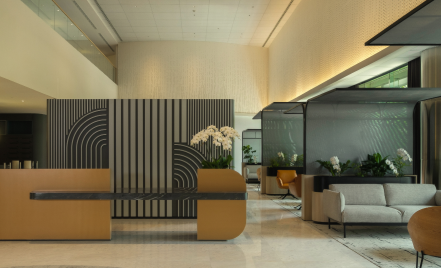Choosing between a shared office vs private office will depend on many factors, such as budget and business needs. Each one has its pros and cons that should be considered as every business will be different in its work style. The right choice will depend on balancing your budget with flexibility, productivity, and any other requirements.
Some startups and growing businesses probably prefer a shared office to reduce costs while having a dynamic environment. Private offices, on the other hand, offer exclusivity and control over the design and the culture of the business.
What is a Shared Office?

As the name suggested, a shared office is a workspace or a common environment where more than one business or individual shares resources. Usually called a co-working environment, where professionals or businesses from different industries coexist to foster collaboration and networking opportunities.
- Advantages of a Shared Office
As mentioned above, what is shared office most notable advantage is the coworking environment it provides. This arrangement is very suitable for startups, freelancers, and remote workers. The advantages are:
- Networking Opportunities due to working and meeting professionals from different industries. This could support potential partnerships by sharing ideas and collaborations.
- Cost-Effective as shared office reduces expenses by splitting costs on utilities, amenities, and rent.
- Prime Locations as usually these shared offices are located in central business districts and provide a prestigious address without the high cost of a private office.
- Flexibility as many shared offices offer flexible and various term leases that allow businesses or professionals to scale up or down as needed.
- Increased motivation and productivity in a dynamic work environment can keep individuals more motivated and can inspire creativity more than working alone from home.
- Disadvantages of a Shared Office
Even with the many advantages of sharing offices with others, we should recognize the disadvantages of a shared office to consider. Therefore, precautionary measures can be taken to avoid discomfort. Here are some of the common concerns you should anticipate:
- Security concerns regarding sensitive data and equipment due to the open nature of the shared office.
- Competition for resources on shared amenities such as office equipment and meeting rooms that may not always be available when needed
- Limited long-term stability due to the flexibility of the shared office system. Changing lease terms and the convenience of relocation could create uncertainty for businesses relying on a fixed address.
- Noise distraction and limited privacy due to the open workspaces shared with multiple professionals or businesses. This could result in reduced concentration and productivity.
What is a Private Office?
Contrary to the above explanation of what is shared office, the best explanation of what is private office is a dedicated workspace exclusively used by an individual or business. It offers a controlled environment with all the amenities and services needed. Businesses such as law firms or financial institutions need this kind of workspace due to their confidentiality in nature.
- Advantages of a Private Office
As mentioned above, a private office offers more privacy and customization as needed. You can enhance the image and branding and customize them as you want, without any distractions from others. Here are some of the advantages of private office:
- Professional image could enhance credibility and provide a prestigious business address for clients or customers.
- Enhanced privacy and security that ensures confidentiality, ideal for secure data handling or sensitive discussions.
- Customization and branding as the business can personalize the workspace to reflect its identity and culture.
- Consistent availability in meeting rooms, office equipment and other office resources.
- Long-term stability due to lease security without unexpected policy changes or relocations.
- Disadvantages of a Private Office
As many advantages of a private office, there are still some disadvantages of private office to consider. Not every type of business could afford these private offices, either due to the limited budget or any other reasons as discussed in the following:
- Higher costs due to the additional costs of office furniture and equipment, utilities, and maintenance.
- Less flexibility in terms of fixed lease terms, usually long-term rentals, limiting adaptability to business growth or changes. This may not be ideal for startups or any businesses needing flexibility.
- Scalability challenges if the business needs to expand or downsize. This could be costly and complex due to lease modifications or even relocations.
- Limited networking opportunities due to the limited or reduced interactions with other professionals from different industries. Employees may experience reduced social engagement that could affect creativity and morale compared to dynamic shared workspaces.
How to Decide: Shared Office vs Private Office?
Choosing between a shared office and private office space depends on your business requirements, budget, and work style. You should assess your priorities, work culture, operational needs, and long-term goals. Here are key factors to consider:
- Business size and growth plans: shared offices will be beneficial for startups and freelancers due to its flexibility. However, the private office offers more stability due to their long-term leases.
- Budget: a shared office is more affordable and cost-efficient. Private offices could be costly but provide more control and exclusivity.
- Customizations and branding will be far easier for private offices. Whereas shared offices have limited customization options.
- Amenities and resources should be the in consideration, whether shared access is sufficient.
- Work environment: private office suits those needing a distraction-free and quiet space. However, shared offices offer a dynamic and interactive setting for collaborations, networking, and flexibility.
Why Choose Flow’s Private Office Solutions?

Flow is a luxury coworking space located in Midplaza with easy access to public transportation such as Setiabudi MRT Station. The two-story area has a world-class design supported with five-star hospitality as AYANA’s known for.
This exceptional coworking space is completed with amenities such as communal areas, and comfortable café, and offers various private offices for professionals. Check Flow’s Instagram @flow.midplaza or go to https://www.workatflow.com to learn more to get the space and professional image that you need.
Conclusion
In the end, choosing between a shared office vs private office space will depend on many factors as discussed above. Therefore, you should assess of your business needs, such as growth, culture, work style, type of business, operations, and of course, your budget.
Keep in mind the long-term goals you want to achieve and whether a shared office is suitable for you more than a private office. However, private offices offer more stability and image branding that you might require. Learn the pros and cons and assess your priorities to make the best decisions for your business.

